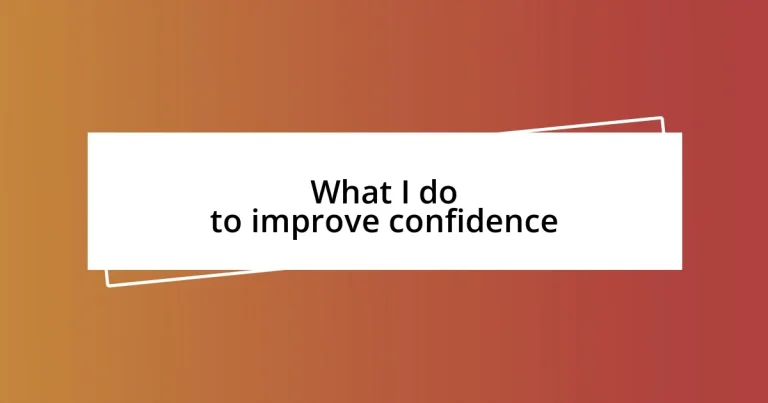Key takeaways:
- Understanding confidence involves recognizing its fluctuations influenced by experiences, achievements, and acknowledging both self-esteem and self-efficacy.
- Identifying personal triggers of self-doubt can help in reframing negative thoughts and enhancing overall confidence.
- Engaging in small, achievable goals, practicing positive self-talk, and seeking support from others can significantly bolster self-confidence and personal growth.
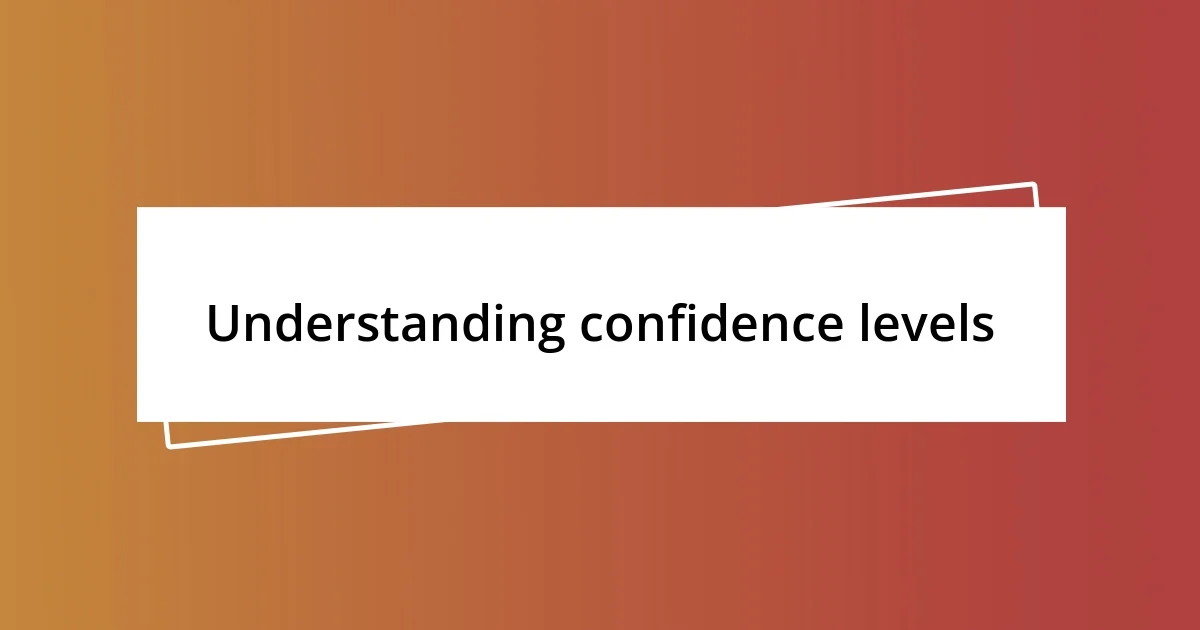
Understanding confidence levels
Understanding confidence levels can often feel like deciphering a complex puzzle. I remember a time in high school when I was terrified to speak in front of the class. The mere thought of it made my heart race. That experience taught me that confidence isn’t a constant; it ebbs and flows based on our experiences and mindset.
Have you ever noticed how your confidence can be influenced by small victories? For me, it was learning to play the guitar. With each chord I mastered, I felt a surge of confidence. It opened my eyes to the idea that confidence can grow incrementally, fueled by personal achievements, no matter how trivial they may seem.
Additionally, understanding that confidence is often split between self-esteem and self-efficacy can be enlightening. I’ve struggled with self-esteem, questioning my worth, but discovering my abilities in certain skills changed everything. It made me realize that building confidence is about acknowledging both who we are and what we can do. How would your life change if you started to view confidence as a collection of your unique experiences, rather than a fixed trait?
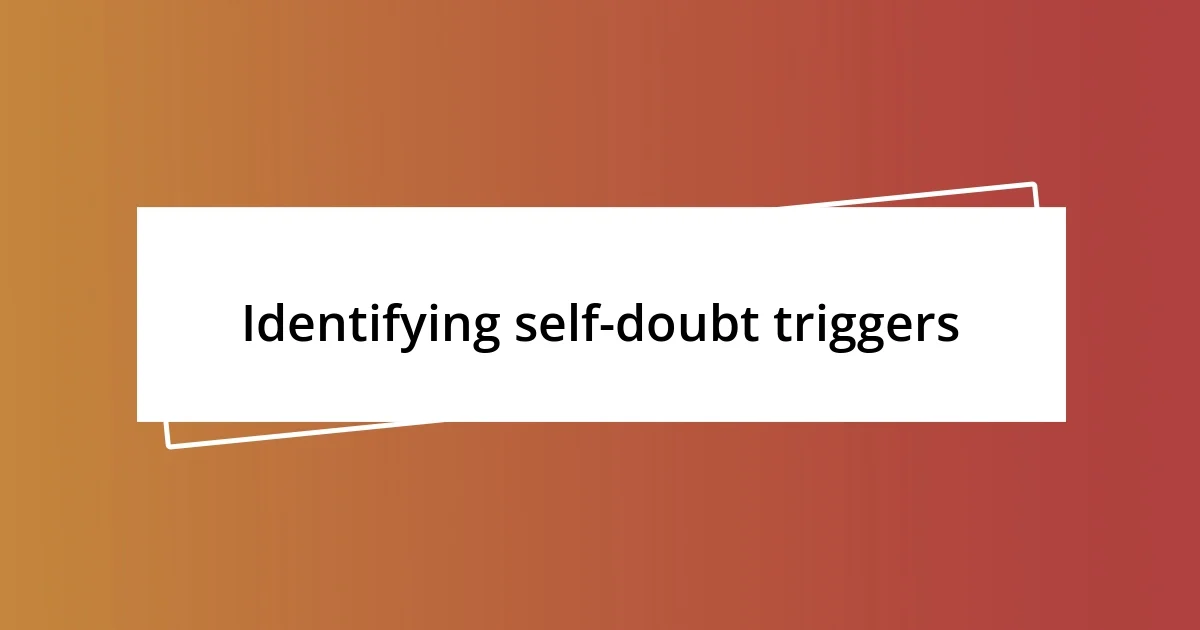
Identifying self-doubt triggers
Identifying the triggers of self-doubt is a crucial step in reclaiming confidence. I’ve often found that certain situations, like networking events or important meetings, can spark an overwhelming wave of self-doubt. It’s fascinating how these triggers rarely stem from my actual capabilities but rather from my perception of how I compare to others. Recognizing these specific moments helps me prepare and reframe my thoughts.
Here are some common triggers you might resonate with:
- Social Situations: Interacting in larger groups can heighten feelings of inadequacy.
- Comparison: Scrolling through social media can intensify self-doubt as I measure my journey against someone else’s highlight reel.
- Negative Feedback: Even constructive criticism can sometimes feel like a personal attack, shaking my confidence.
- High Pressure: Situations where a lot is at stake, such as interviews, can amplify insecurities.
- Past Experiences: Remembering times when I’ve failed can haunt my current pursuits, feeding a cycle of doubt.
Through awareness of these triggers, I’ve started to map out my emotional landscape, allowing me to challenge negative thoughts. It’s a process, but each step towards recognizing what holds me back brings me closer to a more confident version of myself.
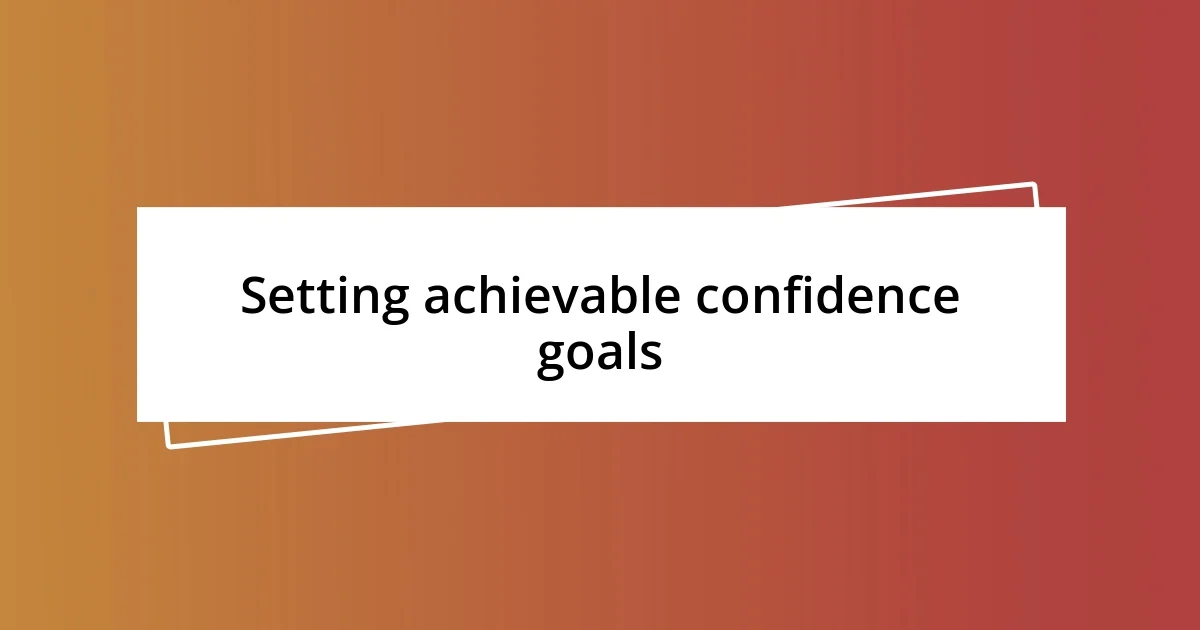
Setting achievable confidence goals
Setting achievable confidence goals is an essential part of my personal growth journey. I recall a time when I aimed to feel more comfortable speaking up in team meetings. Instead of expecting to speak flawlessly, I set a goal to contribute at least once in every meeting. That small, specific goal made a world of difference. It allowed me to focus on progress rather than perfection, gradually building my confidence along the way.
I believe that setting goals isn’t just about identifying what I want to achieve but also about understanding my starting point. For instance, when I wanted to improve my public speaking skills, I began with small local events. By targeting smaller audiences, I felt less pressure. Each experience reinforced my capabilities and, each time I stepped off that stage, I found myself looking forward to the next opportunity.
It’s important to embrace the idea that every small victory counts. Perhaps you want to increase your confidence in social settings. Start by establishing a goal to initiate one conversation during an event. Each success contributes to the broader goal of becoming more confident. In my experience, celebrating these achievements, no matter how minor, can profoundly impact my self-perception.
| Achievable Confidence Goals | Benefits |
|---|---|
| Speak up once in team meetings | Gradual comfort in voicing opinions |
| Attend small local events | Reduced pressure, increased practice |
| Initiate one conversation at gatherings | Enhanced social skills, confidence boost |
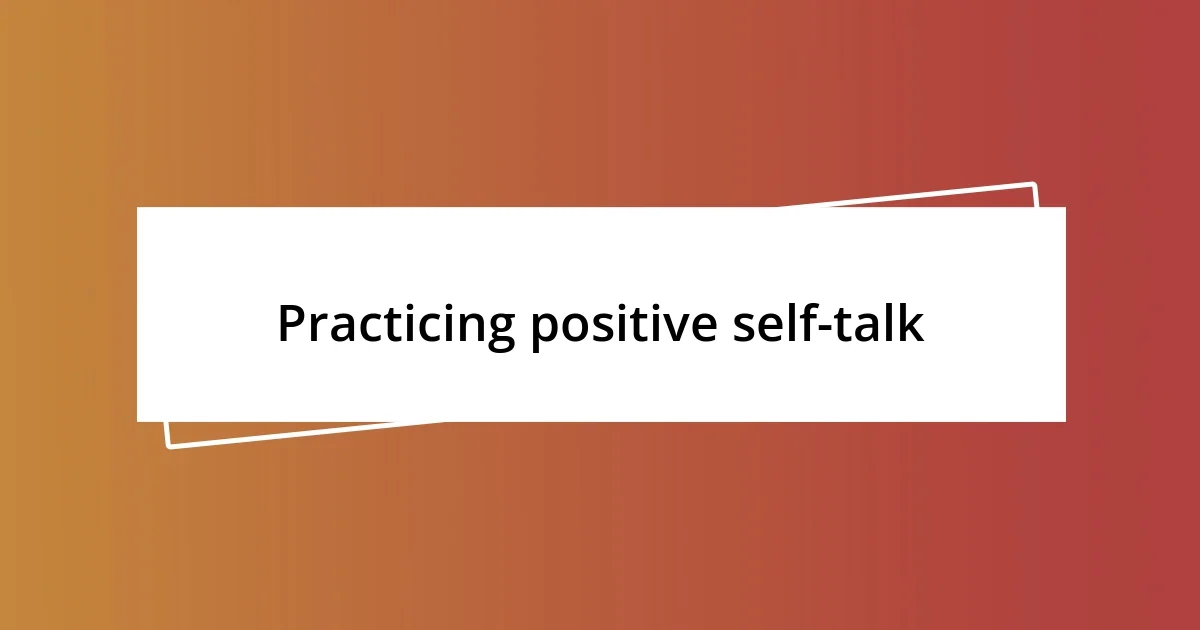
Practicing positive self-talk
Practicing positive self-talk has been a game changer for me. Whenever I catch myself spiraling into negative thoughts, I make a conscious effort to flip the narrative. Instead of thinking, “I can’t do this,” I remind myself, “I’ve overcome challenges before, and I can do this too.” This shift in perspective often sparks a little spark of motivation, turning anxiety into excitement.
I vividly remember a time before a big presentation; I was battling a wave of doubt. I decided to stand in front of the mirror and verbally affirm my capabilities. I looked myself in the eye and said, “You are prepared, you are capable, and this is your moment.” It felt a bit silly at first, but the boost was palpable. Each affirmation I recited helped anchor my thoughts in positivity rather than fear.
Positive self-talk isn’t just about reciting mantras; it also involves re-evaluating the language I use when I reflect on my day. Instead of beating myself up for mistakes, I challenge myself with questions like, “What can I learn from this?” or “How can I approach it differently next time?” That’s where true growth lies. This practice has cultivated resilience in me, making me more willing to face challenges head-on, knowing that my internal dialogue can either be my biggest advocate or a relentless critic. Which one will you choose?
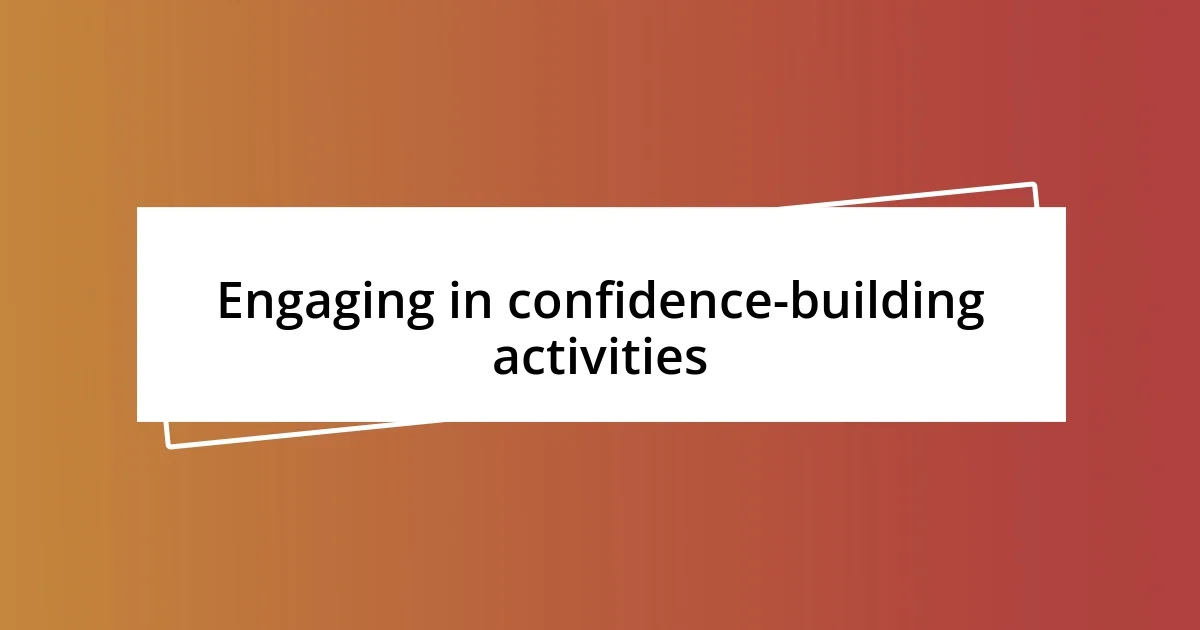
Engaging in confidence-building activities
Engaging in confidence-building activities is a rewarding journey I’ve wholeheartedly embraced. One of my favorites is taking up a new hobby, like dancing. At first, I felt completely out of my element. But with each class, I retained a sense of progress; the thrill of mastering a new step transformed my self-doubt into eagerness. Have you ever tried something completely new? It’s fascinating how stepping outside my comfort zone helped me gain confidence and discover hidden talents.
Another impactful activity for me has been volunteering in community events. I remember my first time coordinating a local charity drive. Initially, I was overwhelmed by the responsibility and unsure of my abilities. However, as I connected with others who shared the same passion, I began to thrive amidst the collective energy. Engaging with various people not only broadened my perspective but also gave me a sense of purpose. What can you gain from helping others in your community? Perhaps the answer lies in the confidence it builds when you realize your contributions matter.
Physical activity also plays a crucial role in my confidence journey. I recall joining a local running club, something I had never considered before. The supportive atmosphere, where experienced runners cheered on beginners like me, made all the difference. It transformed what could’ve been a daunting experience into one filled with encouragement. I can’t help but wonder: How does physical movement shape our self-image? Every stride, every finish line crossed, feels like a step toward a bolder version of myself.
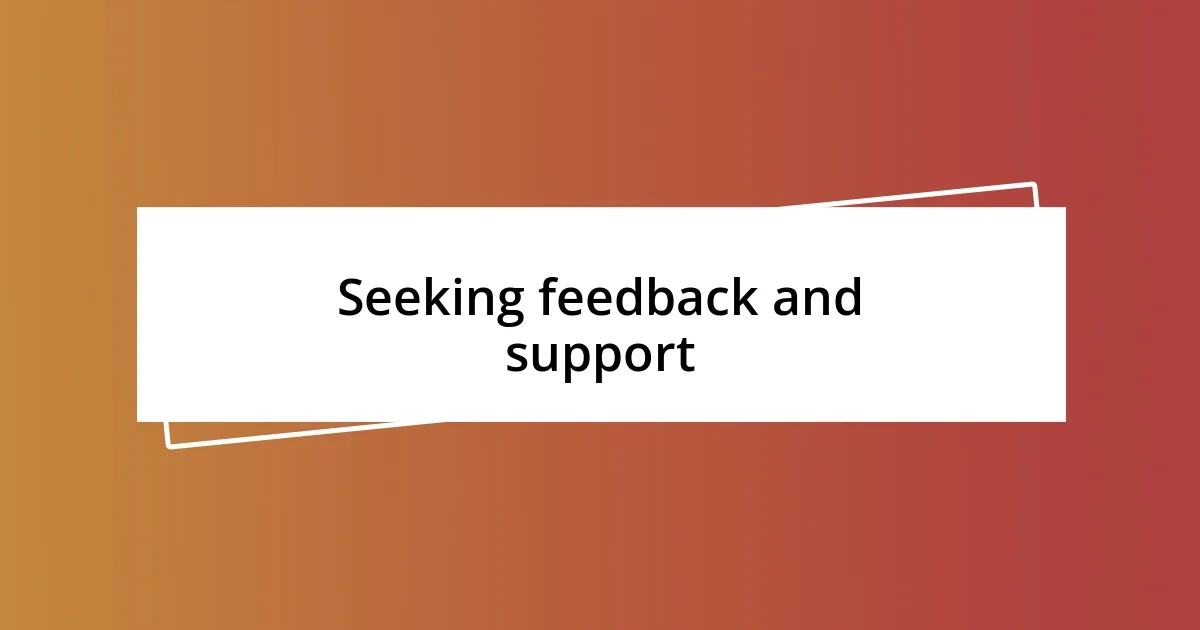
Seeking feedback and support
Seeking feedback and support is a vital part of building my confidence. I remember early on in my career, I was hesitant to ask my peers for input on my work. It felt vulnerable, like opening myself up to potential criticism. However, I eventually realized that constructive feedback often provides new perspectives. I learned to approach colleagues and ask specific questions about my projects. When I started to embrace their insights, not only did my skills improve, but my confidence grew as I understood how others viewed my strengths. How often do we miss out on growth simply because we fear the feedback?
Additionally, support from friends and mentors has been crucial in my confidence journey. I recall a time I was preparing for a significant interview, and I was full of self-doubt. A close friend offered to conduct a mock interview with me. Talking through the process and receiving encouragement helped illuminate my qualifications rather than focusing on my fears. This experience reminded me that it’s okay to lean on others for support. Have you ever had someone believe in you when you struggled to do so yourself? That kind of reassurance can be transformative.
Moreover, I find that discussing my goals with others creates a sense of accountability. When I share my aspirations, the fear of letting others down can act as a motivating force. There was an instance when I committed to a public speaking event, and sharing it with my circle not only kept me accountable but also generated a wave of support from them. This collective encouragement transformed my anxiety into enthusiasm. It’s fascinating how the presence of supportive people can change our outlook and ultimately bolster our self-esteem. How might your confidence enhance if you actively sought out feedback and surrounded yourself with a supportive network?
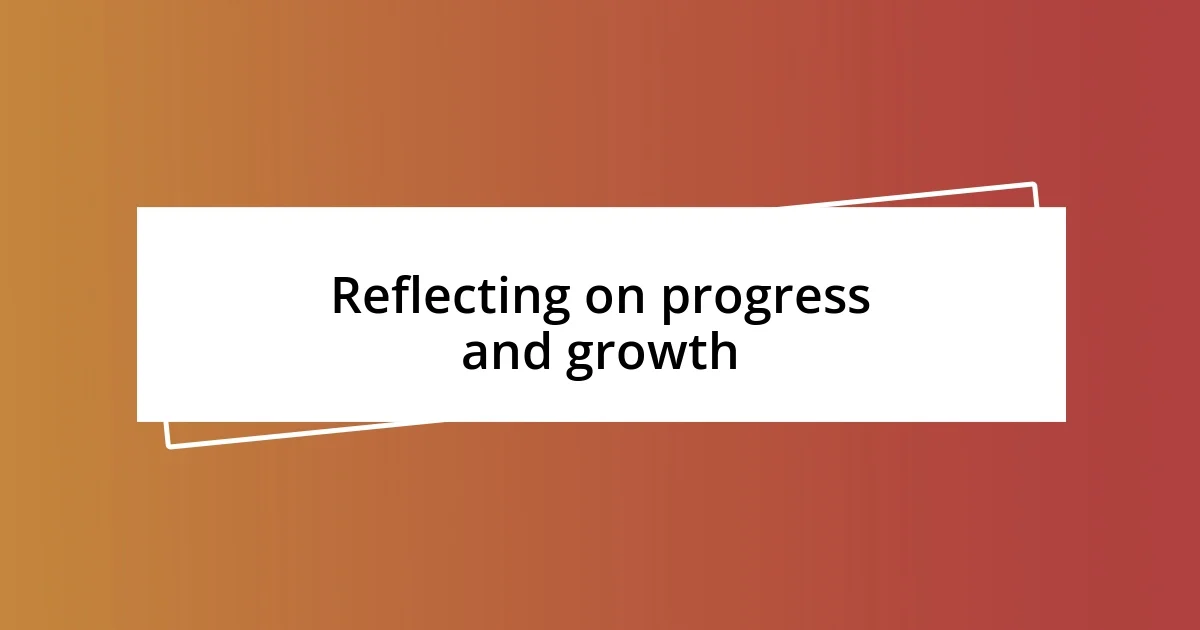
Reflecting on progress and growth
Reflecting on my progress and growth has become a powerful habit for me. For instance, I often find myself sitting quietly at the end of each month, jotting down the milestones I’ve achieved—big or small. Just the other day, I looked back at my journey and was amazed at how far I’d come since I first set those daunting goals. It’s almost like holding a mirror to my efforts, realizing that the challenges I once faced were stepping stones toward my current self.
As I reflect, I’ve learned that celebrating the small victories is crucial. I remember a time when I finally nailed a presentation I had prepared for weeks. At that moment, I took a step back to see the endless hours of practice and doubt dissolve into sheer accomplishment. Has there been a moment in your life where you recognized your growth in the face of challenges? Those instances carry a breath of fresh air, reminding me that every little achievement plays a significant role in the larger picture.
Regular reflection also helps me identify areas for improvement. When I analyze my experiences, I often ask myself what I could have done differently. Recently, I reviewed a project that didn’t meet my expectations. Instead of dwelling on my perceived failures, I pinpointed specific actions that could lead to better outcomes next time. This approach not only enhances my skills but also boosts my self-esteem, showing me that growth is not linear—it’s a continuous process. How do you view your own journey of growth?












